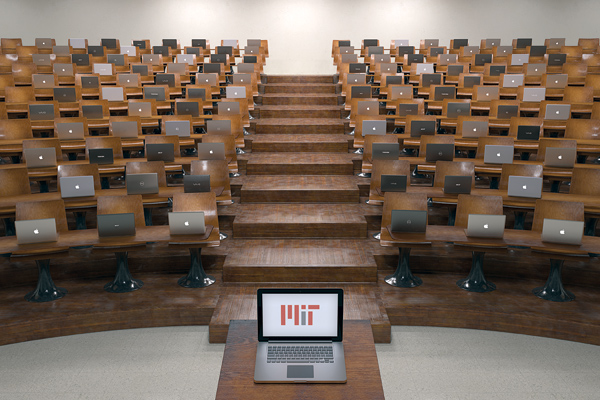With EdX, School’s Out—Forever

Illustration by Justin Metz
Brian Ho sits at a desk in his home in suburban Honolulu, staring at a computer screen. He’s already worked a full day at his software development company, but instead of taking this June evening to relax, the self-taught computer programmer is trying to “put together” a circuit on his screen. The 51-year-old attaches wires to batteries, diodes, and capacitors in a virtual laboratory that appears on his monitor. It’s not easy—but then again, the Massachusetts Institute of Technology never has been.
This past March, Ho signed up for MIT’s first online course taught by a real professor, with actual grades. For Ho, who’d barely scraped his way through high school before earning an electrical engineering degree from the University of Hawaii in 1992, this was a chance to take a course at the school he once dreamed of attending. For MIT, it was a test run of a new educational venture it had dubbed MITx. The idea behind MITx is to offer a full class on the Internet, taught by a tenured professor, complete with video lectures, tutorials, and graded assignments. Anyone can sign up, for free. At a time when tuition and fees at private universities are averaging more than $28,000, that price has attracted a lot of interest.
And the MIT project is actually part of a movement. In the past year a new wave of education startups have been pushing the radical notion that knowledge is important, but a diploma isn’t. Whether it’s computer programming or corporate communications, goes the thinking, an expert understanding of the subject is far more important to an employer than a college transcript. And this isn’t just some hazy theoretical musing. Investors are making big bets on it. This past spring, for example, two competency-focused startups offering free online classes—Coursera and Udacity—spun out of Stanford University. Each of them has received millions in venture funding despite lacking a public business model to make money.
MIT was hoping to enroll a mere 2,000 students for its first class on circuits—it was, after all, a course in electrical engineering. Anant Agarwal, the professor, took his on-campus course designed for math and science whizzes and adapted it into an online format. The response was staggering: More than 150,000 students of all ages and education levels, from Massachusetts to Argentina to Pakistan, signed up. Harvard was so impressed that in May, it joined forces with MIT. The two schools pooled $60 million in resources and renamed the venture edX. The stated mission was to educate a billion people around the world.
Many of the students in that first course were like Ho: years out of college and looking to improve their knowledge—or just wanting to be able to say that they were “taking a course at MIT.” The potential of edX, though, goes far beyond teaching older students. It could become an entirely new model not just for undergraduate education, but for education, period. Faculty and supporters argue that it has the potential to transform how students learn. It might also make an expensive four-year degree a luxury in the modern workforce rather than a necessity. By educating the world free of charge, edX could make MIT and Harvard obsolete.
But just how revolutionary is all of this? Is putting a bunch of lectures and playing with circuits online really the same as a well-rounded classical education? And how can classes on the Internet possibly replicate the on-campus experience?
That’s not the point, say supporters. They’re not looking to replicate college, they’re looking to disrupt it. “If people have been skeptical about online learning or its place in the future, edX throws that theory to waste,” says Michael Horn, an executive director of the Innosight Institute, a Silicon Valley-based think tank focused on education and healthcare innovation.“To see Goliaths like Harvard and MIT enter the arena sends a powerful signal. It is very exciting and is going to transform education in pretty profound ways.”
In his Hawaii home, Ho types in an answer and within seconds a bright green check mark pops up on his screen. He got the question right. “It’s instant gratification, like playing a video game,” he says. “Everyone who takes the class online says they’re addicted to the green check mark. We joke that this isn’t just an engineering course, it’s also a psychology thesis.”